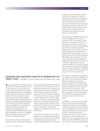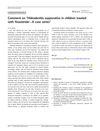 July 2003 in “Journal of Cutaneous Medicine and Surgery”
July 2003 in “Journal of Cutaneous Medicine and Surgery” Various skin conditions can be treated effectively with different methods, such as discontinuing certain drugs, using specific vaccines, applying creams, and changing lifestyle habits like smoking and drinking.
 July 2003 in “Journal of Cutaneous Medicine and Surgery”
July 2003 in “Journal of Cutaneous Medicine and Surgery” Skin problems are common in Bangladesh due to arsenic, prompt treatment of diabetic foot ulcers is crucial, maternal transmission causes most neonatal herpes, treatments for pediatric vasculitis are effective, the chickenpox vaccine works, more frequent UVB therapy helps psoriasis, certain jobs increase hand dermatitis risk, monoclonal antibodies treat psoriasis well, lifestyle affects psoriasis, alefacept improves psoriasis, imiquimod cream partially clears basal cell carcinoma, and iron may not help chronic hair loss.
 July 2003 in “Journal of Cutaneous Medicine and Surgery”
July 2003 in “Journal of Cutaneous Medicine and Surgery” Stopping certain drugs can improve skin conditions, arsenicosis affects over half of a Bangladeshi village, males are more vulnerable, and certain treatments are effective for warts, acne, and psoriasis. Smoking and drinking are linked to psoriasis in men, a cream helps with a type of skin cancer, and low iron levels don't directly cause chronic hair loss in women.
 35 citations,
May 2008 in “Journal of Clinical Oncology”
35 citations,
May 2008 in “Journal of Clinical Oncology” A cancer patient died from a severe skin reaction after taking the drug cetuximab.
 35 citations,
August 2004 in “Epilepsy & behavior”
35 citations,
August 2004 in “Epilepsy & behavior” Extended-release divalproex is better tolerated and more effective for seizures and psychiatric symptoms than delayed-release divalproex, but doesn't reduce hair loss.
 16 citations,
March 2018 in “Seminars in Oncology”
16 citations,
March 2018 in “Seminars in Oncology” The document concludes that pregnancy and cancer share immune evasion tactics, but more research is needed before using checkpoint blockade immunotherapy in pregnant cancer patients to avoid harm to the placenta.
 11 citations,
July 2003 in “The Nurse practitioner”
11 citations,
July 2003 in “The Nurse practitioner” New treatments for PCOS focus on managing symptoms and improving fertility.
 March 2024 in “Cleveland Clinic journal of medicine”
March 2024 in “Cleveland Clinic journal of medicine” Alpha-blockers and 5-alpha reductase inhibitors are main treatments for BPH, with new support for phosphodiesterase-5 inhibitors and beta-3 agonists.
 January 2016 in “Springer eBooks”
January 2016 in “Springer eBooks” Understanding drug interactions, side effects, and patient-specific factors is crucial for effective dermatological care.
 49 citations,
December 2007 in “Journal of Cataract and Refractive Surgery”
49 citations,
December 2007 in “Journal of Cataract and Refractive Surgery” Finasteride may cause floppy-iris syndrome during cataract surgery, so check patients' medical history.
 47 citations,
April 2016 in “Lasers in Surgery and Medicine”
47 citations,
April 2016 in “Lasers in Surgery and Medicine” Low-level laser therapy may improve hair regrowth and thickness for androgenetic alopecia, but more research is needed.
 19 citations,
January 2012 in “International Journal of Trichology”
19 citations,
January 2012 in “International Journal of Trichology” Propionibacterium acnes might be linked to hair casts and possibly alopecia.
 3 citations,
May 2003 in “BJUI”
3 citations,
May 2003 in “BJUI” Doxazosin alone or combined with finasteride improves prostate symptoms better than finasteride alone, without extra benefits.
 2 citations,
August 2020 in “Cosmetics”
2 citations,
August 2020 in “Cosmetics” Herbal formula shows promise for hair loss treatment.
 1 citations,
January 2018 in “Pediatric Dermatology”
1 citations,
January 2018 in “Pediatric Dermatology” Finasteride may help treat hidradenitis suppurativa in children, but concerns exist about ethics, safety, and proper use.
 December 2020 in “Actas Dermo-Sifiliográficas”
December 2020 in “Actas Dermo-Sifiliográficas” LLLT increases hair density and growth in AGA patients.
 85 citations,
April 2007 in “Dermatologic Clinics”
85 citations,
April 2007 in “Dermatologic Clinics” Some drugs can cause hair loss, change hair color and shape, or increase hair growth, and treatment may involve stopping the drug or using specific hair growth treatments.
 82 citations,
August 2006 in “Pharmacology, Biochemistry and Behavior”
82 citations,
August 2006 in “Pharmacology, Biochemistry and Behavior” Certain steroids in the brain affect mood and symptoms of depression, and treatments targeting these steroids show promise for improving these symptoms.
 78 citations,
February 2011 in “Canadian Medical Association Journal”
78 citations,
February 2011 in “Canadian Medical Association Journal” Acne treatment varies, with topical and systemic therapies effective, and more research needed on treatment order and long-term effects.
 62 citations,
July 2018 in “Lasers in Medical Science”
62 citations,
July 2018 in “Lasers in Medical Science” LED therapy is safe and shows potential for treating skin conditions and promoting hair growth, but more research is needed.
 33 citations,
September 2016 in “Lasers in Surgery and Medicine”
33 citations,
September 2016 in “Lasers in Surgery and Medicine” Fractional resurfacing is safe and effective for certain skin conditions in Asian patients, but care must be taken to avoid skin pigmentation issues.
 2 citations,
April 2017 in “Journal of Investigative Dermatology”
2 citations,
April 2017 in “Journal of Investigative Dermatology” Tofacitinib helped over half of the patients with severe hair loss regrow at least 50% of their hair.
 1 citations,
April 2018 in “The journal of investigative dermatology/Journal of investigative dermatology”
1 citations,
April 2018 in “The journal of investigative dermatology/Journal of investigative dermatology” Oral tofacitinib significantly improves lichen planopilaris symptoms without adverse effects.
 April 2018 in “The journal of investigative dermatology/Journal of investigative dermatology”
April 2018 in “The journal of investigative dermatology/Journal of investigative dermatology” Samcyprone ointment is effective for treating common warts if a sensitization reaction occurs first.
 November 2019 in “Actas Dermo-Sifiliográficas”
November 2019 in “Actas Dermo-Sifiliográficas” Oral minoxidil helps treat hair loss and has reversible side effects.

Treatments for hair loss vary, but cell-based options may be the future.
 100 citations,
April 2010 in “Expert Opinion on Pharmacotherapy”
100 citations,
April 2010 in “Expert Opinion on Pharmacotherapy” Hair loss in men treated best with early medication or transplant, new treatments researched.
 27 citations,
November 2013 in “Dermatologic Therapy”
27 citations,
November 2013 in “Dermatologic Therapy” New test predicts if hair loss treatment will work.
 18 citations,
December 2014 in “Obstetrics and Gynecology Clinics of North America”
18 citations,
December 2014 in “Obstetrics and Gynecology Clinics of North America” Losing 5-10% body weight can improve PCOS symptoms, letrozole is better than clomiphene for fertility, and managing weight and blood sugar is important to reduce pregnancy complications.
 17 citations,
June 2012 in “Australasian Journal of Dermatology”
17 citations,
June 2012 in “Australasian Journal of Dermatology” Finasteride and low-dose dutasteride combo improves hair growth and reduces hair loss with no major side effects.






























